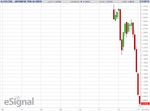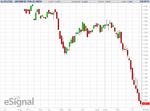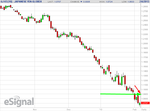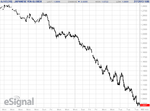Yen Bounces After Touching Multi-Year Lows
Today’s rally is not likely to be anything more than a small correction after the huge downfall. Nothing fundamentally has changed for the currency. The Japanese government is still keen on weakening the currency and a new Bank of Japan Governor will likely be even more aggressive that the current BoJ leader Masaaki Shirakawa (who himself is not shy of easing the monetary policy to boost growth and push the currency down).
Some of the current yen’s strength is likely coming from the uncertainty about the eurozone. The political and financial instability makes traders less willing to risk and that adds premium to safe currencies, including the yen.
Yeah, all these guys are very good at telling us what the trend has been until here and that it will continue forever. Very easy. Especially if they're investing nothing. Practically explaining the market with a delay of a week. Can't go wrong like that.
I remember these guys, these commentators, maybe traders or not even traders. They just comment in favor of the trend, and when it reverses, they say it is just temporary, even when it isn't. Anything that goes against the trend, they say "it is just a temporary correction". Then, when the "temporary correction" becomes the new trend, because it keeps going for weeks, then they pretend they've been saying it all along, and speak about the uptrend just the same way they've been speaking about the downtrend. They are always right, except always late 2 weeks. Even worse are the regular economic journalists, who always find a reason to explain ("weakness due to comments by x politician", "due to" or "despite", is usually what they say).
Yesterday, as I was falling asleep, I was thinking about how a currency, or any asset, rises and falls.
Well, first of all, there's as many buyers as there are sellers, so let's not make that mistake most people make.
To make it fall, people selling are more interested in selling than people buying.
So let's picture it. As best as we can.
There's this crowd of people who have the yen. And there's these guys who don't have enough and want to buy more.
The guys with the yen want to sell them? Ok, let's try this.
The guys who have to buy them aren't that interested.
"1.4? Ok, for today, but tomorrow I want lower, or I won't buy any."
Ok, so the yen keeps falling.
But then all of a sudden all these guys who wanted to sell the yen, who were afraid, or needed to sell it... they don't have any more yen to sell.
And, as the yen falls, there's more and more people willing to buy it.
Right?
So, how can it just keep on falling, week after week, for 13 straight weeks?
Well, it does, and my comparison and simplified explanation ain't going to tell when it will stop falling.
But hell... I tried to understand what's going on.
Damn, I wish I could be in the mind, for just one day, of every person buying and selling yen.
Just for once, to understand what's going on. And why it rises and falls at once, instead of going up and down like the other currencies.
...
Ok, while I waited and wrote... JPY rose again, and now I am at 20k again. I should get out and I usually would get out after being so scared stiff... but I can afford, mentally, to wait a little longer. Especially after what i just said: the yen rises and falls all at once, for days and days, and even weeks and weeks.
I could make a fortune with these 4 contracts, if I just kept them a little longer. I am talking dozens of thousand of dollars.
5000 dollars every 100 ticks.
And it could easily rise 300 ticks.
Do I have the balls and recklessness?
Don't know.
Just have the balls to risk blowing out, but it seems I never have the balls to let my profits run.









